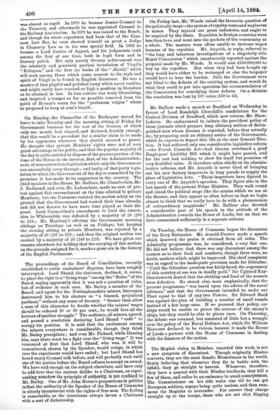On Monday, the Chancellor of the Exchequer moved for leave
to take Tuesday and the morning sitting of Friday for Government business for the rest of the Session, of which only one month had elapsed, and declared, frankly enough, that this would be a precedent for a similar claim to be made by his opponents whenever they should succeed to power. He thought that private Members' rights were not of very great advantage to the public, and that the popular majority of the day is quite entitled to dispose of the greater portion of the time of the House in the interest, first, of the Administration ; next, of non-contentious legislation which only the Government can successfully carry through ; and lastly, of that party legis- lation to which the Government of the day is committed by the promises it has made to its supporters in the country. The chief speakers in the House, Mr. Balfour, Mr. Chamberlain, Mr. J. Redmond, and even Mr. Labouchere, made no sort of pro- test against this encroachment on the time allotted to private Members ; but the Unionists resisted the motion solely on the ground that the Government had wasted their time already, and did not deserve to have more time placed at their dis- posal. Lord Carmarthen's amendment to limit the conces- sion to Whitsuntide was defeated by a majority of 24 (268 to 244); Mr. Hanbury's offering the Government morning sittings on Tuesdays (as well as on Fridays), but keeping the evening sitting to private Members, was rejected by a majority of 28 (247 to 219); and then the original motion was carried by a majority of 26 (249 to 223). We have given our reasons elsewhere for holding that the carrying of this motion, on the grounds assigned for it, marks a great era in the history of the English Parliament.


































 Previous page
Previous page